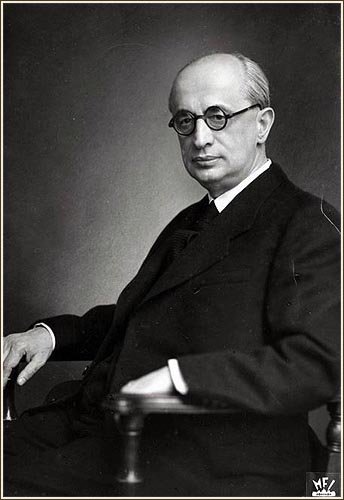The 23rd of October is the anniversary of the 1956 uprising in Budapest against the Soviet regime in Hungary. It began as a student-led demonstration, which marched through the streets of Budapest to the Parliament building. As they marched, students announced a list of 16 demands for the government. Violence broke out on the streets when demonstrators were fired upon by the State Security Police outside the radio building. A short lived revolution spread throughout the country that was ultimately unsuccessful when the Russians again stormed the country on 4 November.
László Ravasz, was the former bishop of the Dunabian church district but was forced from his position in 1948 when the Communist government began the "systematization" of churches. During the 1956 uprising, the "Movement for Renewal of the Reformed Church" called for the resignation of current church leadership and the reinstallation of Ravasz to his former position. He gave a radio speech on 1 November, the same day Prime Minister Imre Nagy declared the neutrality of Hungary and called on the United Nations for assistance without effect. Ravasz spoke these words to the Hungarian people through a radio address:

The Reformed Church in Hungary pays respect and admiration to the heroes of the national uprising: students, workers, soldiers, men and women, who earned the victory of their moral liberation with their shed blood.
She weeps as a mother for all her children: for all Hungarians who gave their life and hereby made national freedom more precious with their blood. Kisses to the wounds and flowers to their graves! To all wounds and graves, but especially painful and tearful ones at the tombs of those two young students of religion, two Reformed theological students, who died a hero's death no more than a couple hundred meters away from the gate of their alma mater.
The Reformed Church in Hungary is proud that this uprising was clean and was under the protection of national honour. There is no other prayer, but that it forever remains this way!
We confess with repentance that the Church as an earthly institution allowed itself to be paralysed under the pressure of the deadly-opposite political authority's acts and violence, and because of these, her eternal moral duties have met with failure. Now she works to free herself from these ties. She asks all the Christian churches of the world, especially from the World Council of Churches and the World Alliance of Presbyterian Churches [Reformed Churches holding a Presbyterian System] for fraternal help to stand tall again and follow her pre-ordained way.
She asks pastors to be the living conscience of our nation. As the loyal steward of the Word, interpret God's gracious message clearly and bravely in order to comfort, reprimand and illuminate.
Furthermore we ask the elders – as the democratically chosen elite of our Hungarian nation and especially village societies – to be an example in the service of national unity, social justice and fraternal love. In the integral framework of national unity, reinforce the moral solidarity of Christian churches and the spirits of believers, especially respecting everyone's freedom of faith and conscience.
Reaction is not the only opposite of uprising, but anarchy. Perish the thought of the restoration of old time regimes! Our only possible aim is the preservation and improvement of the achievements of the revolution, the mending of its faults, and the reparation of its injustices. At the same time we have to guard against anarchy. It is an essential condition, a matter of life and death, to restore the order and rest. To capture and convict the guilty should never be an object of personal action, but it is the task of state authorities and independent courts.
When we came up from the cellar after the siege, during the first service at Kálvin Square, – at the same time the church was shot from Buda and a snow storm was whipping through the broken church window – the text of the sermon was the following:
"Do not be deceived: God cannot be mocked. A man reaps what he sows."
Salute those who sow the seed of justice and love!
Several seminary students were wounded in the street fights in 1956. Ferenc Batka, student of the Theological Academy in Sarospatak, was killed in the fusillade at the Parliament on 25 October and two other martyrs, István Magócsi and Lajos Herczegh from the seminary in Budapest, were killed a short distance from the seminary gates. A memorial plaque in the courtyard of the Károli Gáspár Seminary in Budapest honors the two students' memories. According to witnesses, they were killed while out buying bread for the college's kitchen.
More than 3,000 people were killed in the revolution's fighting, among them 720 Soviets. Thousands were sentenced to prison in the reprisals, but the true long-term effect of the uprising was the resulting Hungarian emigration, considered a new "brain drain" – more than 200,000 people left the country, mainly young people.
Translated by: Timea Túri and Diána Erdélyi
Intro: Amy Lester
Cover photo: content.time.com